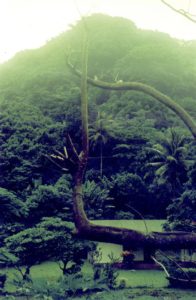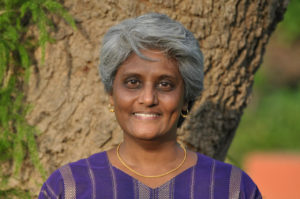
What We Talk About
When We Talk About the Weather
by Usha Alexander
[This is the first in a series of essays, On Climate Truth and Fiction, in which I raise questions about environmental distress, the human experience, and storytelling.]

(Photo by Usha Alexander used with permission)
In 1997, I was living on Ambae, a tiny, tropical island in the western South Pacific. Rugged, jungle-draped, steamy, volcanic Ambae belongs to Vanuatu, an archipelago nation stretching some 540 miles roughly between Fiji and Papua New Guinea. There, under corrugated tin roofs, in the cinderblock classrooms of a small, residential school, I taught science to middle- and high-schoolers as a Peace Corps volunteer.
That December, the rainy season was in full force, with heavy downpours most afternoons, lasting sometimes long into the night. Never before had I, and never again would I, witness rains like those, where the water poured straight down, not in drops, but in globs and sheets. Standing in it felt like standing under a waterfall; I’d catch myself stepping forward or back, left or right, in an attempt to get out from under the flow, but it was everywhere. It seemed impossible that the sky could hold so much water, constricting summer’s broad daylight to a sodden gloaming.
One evening, during such a downpour, I left a teachers’ year-end potluck to return to my room — one in a row of tiny, concrete flats for the school’s single female staff. Mine was not much more than 100 yards away across an open lawn, which was now filled with ankle-deep water flowing gently down the long campus green toward the sea. As this was not my first deluge, I wasn’t concerned by the prospect of a routine water-logging; it was only water, after all, and not at all cold. The only problem was that the rains had washed away all light into a blind, enveloping darkness. I knew that once I stepped into it I would become disembodied, aware of my limbs only through my untrained sense of proprioception. How dependent we are upon the faculty of sight, even to know where we end and the external world begins.

Usha Alexander was born to Indian immigrants who came to the United States in the 1950s and settled in the very small town of Pocatello, Idaho. She ran away to university at the age of 19, and later joined the US Peace Corps, where she served as a science teacher in the archipelago nation of Vanuatu. In the late 90s, Usha made her way to the San Francisco Bay Area of California, where she settled and worked for Apple Computer for many years.
Since 2013, Usha resides with her partner, writer and photographer, Namit Arora, in the National Capital Region of India. Usha has lived in four different countries and has learned to carry her home within herself, yet she frequently returns to the CA Bay Area with a certain sense of homecoming.